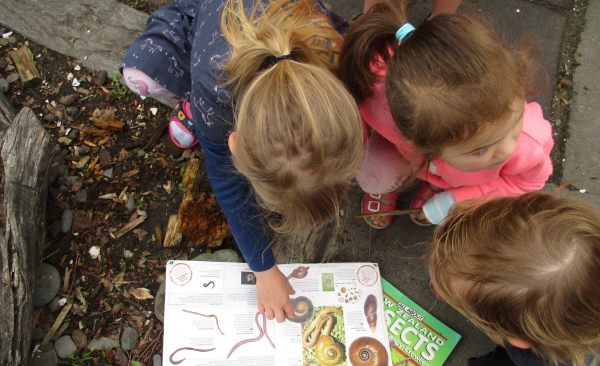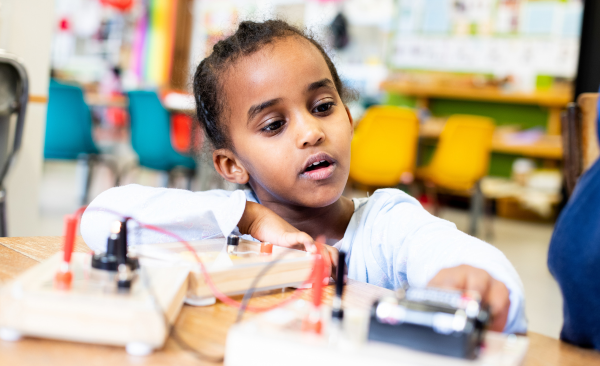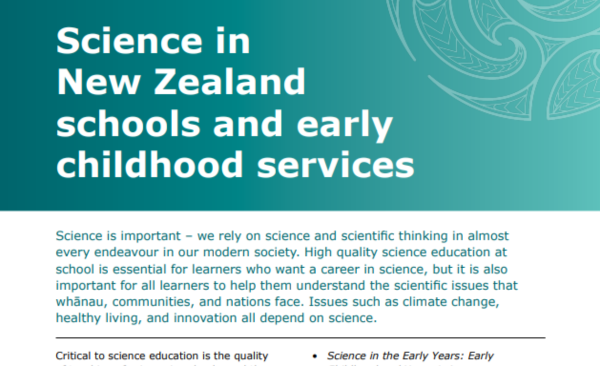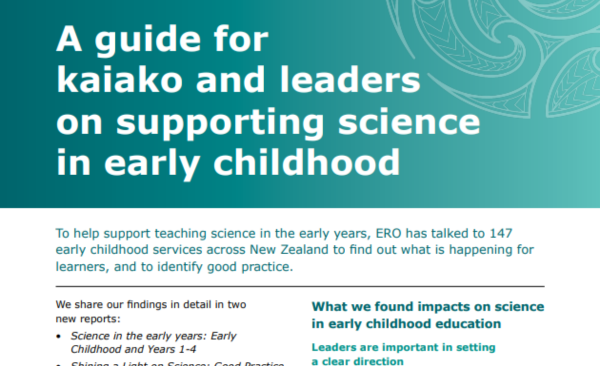Related insights
Explore related documents that you might be interested in.
Read Online
Why science matters at this age
Science is a useful way to explore and make sense of the world, at any age.
Science involves:
- systematically making and testing ideas
- collecting evidence through a variety of methods
- problem-solving
- creating new knowledge.
Teaching young children science builds on their natural curiosity, helps them learn about themselves and the world around them, and to begin to think in scientific ways. This sets them up for ongoing learning in science, as well as helping them become creative, critical thinkers; useful skills for any future pathway they choose.
Science is a useful way to explore and make sense of the world, at any age.
Science involves:
- systematically making and testing ideas
- collecting evidence through a variety of methods
- problem-solving
- creating new knowledge.
Teaching young children science builds on their natural curiosity, helps them learn about themselves and the world around them, and to begin to think in scientific ways. This sets them up for ongoing learning in science, as well as helping them become creative, critical thinkers; useful skills for any future pathway they choose.
What can you expect?
Te Whāriki (the early childhood curriculum) is a bicultural curriculum for all children. It is a holistic curriculum that describes children’s learning across five strands:
- Wellbeing | Mana Atua
- Belonging | Mana Whenua
- Contribution | Mana Tangata
- Communication| Mana Reo
- Exploration | Mana Aotūroa.
Kaiako (early childhood educators/teachers) are expected to use these strands, along with what they know about children, their family/whānau and their community, to plan for children’s learning across a variety of areas, including science.
When planning for children’s learning in science, kaiako should:
- set up interesting environments or resources for children to explore
- think about what children already know and are interested in
- plan for ways to reflect children’s languages and cultures in the science contexts and experiences they offer
- include te ao Māori, for example by including Māori practices and values, or ngā pūrākau (myths and legends)
- include stories, places, and experiences that are meaningful to children and their whānau.
Te Whāriki (the early childhood curriculum) is a bicultural curriculum for all children. It is a holistic curriculum that describes children’s learning across five strands:
- Wellbeing | Mana Atua
- Belonging | Mana Whenua
- Contribution | Mana Tangata
- Communication| Mana Reo
- Exploration | Mana Aotūroa.
Kaiako (early childhood educators/teachers) are expected to use these strands, along with what they know about children, their family/whānau and their community, to plan for children’s learning across a variety of areas, including science.
When planning for children’s learning in science, kaiako should:
- set up interesting environments or resources for children to explore
- think about what children already know and are interested in
- plan for ways to reflect children’s languages and cultures in the science contexts and experiences they offer
- include te ao Māori, for example by including Māori practices and values, or ngā pūrākau (myths and legends)
- include stories, places, and experiences that are meaningful to children and their whānau.
How can you work with your child’s kaiako (early childhood educators/teachers) to support their learning in science?
- Notice and share with kaiako (early childhood educators/teachers) what your child is interested in at home – kaiako could use that as a context for science.
- Share anything you’ve been working on with your child – their kaiako could build off it.
- Share what you know about your child’s understanding of the world – kaiako can help your child think more deeply.
- Let your child’s kaiako know about your strengths and interests, if you’re willing to share that with the children and/or kaiako.
- If you can, offer to help with excursions to interesting places in your local community.
- If you know any experts in the community, who could help with children’s learning in science, ask your child’s kaiako if you could help them connect.
- Ask kaiako how you might build on your child’s interests at home.
- Notice and share with kaiako (early childhood educators/teachers) what your child is interested in at home – kaiako could use that as a context for science.
- Share anything you’ve been working on with your child – their kaiako could build off it.
- Share what you know about your child’s understanding of the world – kaiako can help your child think more deeply.
- Let your child’s kaiako know about your strengths and interests, if you’re willing to share that with the children and/or kaiako.
- If you can, offer to help with excursions to interesting places in your local community.
- If you know any experts in the community, who could help with children’s learning in science, ask your child’s kaiako if you could help them connect.
- Ask kaiako how you might build on your child’s interests at home.
If you want to find out more about science teaching and learning for this age group, you can read our reports:
- Science in the Early Years: Early Childhood and Years 1-4
- Shining a Light on Science: Good Practice in Early Childhood Services.
We appreciate the work of all those who supported this evaluation, particularly the children, leaders and teachers who shared with us about science in their service. Their experiences and insights are at the heart of what we have learnt. You can find the full reports on science in early childhood education services, along with a short summary of the findings, on ERO’s website www.ero.govt.nz.
- Science in the Early Years: Early Childhood and Years 1-4
- Shining a Light on Science: Good Practice in Early Childhood Services.
We appreciate the work of all those who supported this evaluation, particularly the children, leaders and teachers who shared with us about science in their service. Their experiences and insights are at the heart of what we have learnt. You can find the full reports on science in early childhood education services, along with a short summary of the findings, on ERO’s website www.ero.govt.nz.
Publication Information and Copyright
A guide for parents and whānau on supporting science in early childhood
Published April 2021
Except for the Education Review Office’s logo used throughout this report, this copyright work is licensed under Creative Commons Attribution 3.0 New Zealand licence. In essence, you are free to copy, distribute and adapt the work, as long as you attribute the work to the Education Review Office and abide by the other licence terms. In your attribution, use the wording ‘Education Review Office’, not the Education Review Office logo or the New Zealand Government logo.
A guide for parents and whānau on supporting science in early childhood
Published April 2021
Except for the Education Review Office’s logo used throughout this report, this copyright work is licensed under Creative Commons Attribution 3.0 New Zealand licence. In essence, you are free to copy, distribute and adapt the work, as long as you attribute the work to the Education Review Office and abide by the other licence terms. In your attribution, use the wording ‘Education Review Office’, not the Education Review Office logo or the New Zealand Government logo.
Introduction
Learning science in the preschool years helps children become better problem solvers and critical thinkers. Children are curious by nature and are eager to explore, question, experiment, and learn about science through play. Early childhood educators can use a playbased approach to teaching science to give children opportunities to explore, experiment, and express new ideas.
This short guide for parents and whānau of children in early childhood education draws from ERO’s two new reports on science in the early years: Science in the Early Years: Early Childhood and Years 1-4; and Shining a Light on Science: Good Practice in Early Childhood Education, and aims to help you:
- understand why science matters for this age group
- know what you can expect for science teaching and learning for your child
- think about how you can support your child’s learning journey in science.
Learning science in the preschool years helps children become better problem solvers and critical thinkers. Children are curious by nature and are eager to explore, question, experiment, and learn about science through play. Early childhood educators can use a playbased approach to teaching science to give children opportunities to explore, experiment, and express new ideas.
This short guide for parents and whānau of children in early childhood education draws from ERO’s two new reports on science in the early years: Science in the Early Years: Early Childhood and Years 1-4; and Shining a Light on Science: Good Practice in Early Childhood Education, and aims to help you:
- understand why science matters for this age group
- know what you can expect for science teaching and learning for your child
- think about how you can support your child’s learning journey in science.




